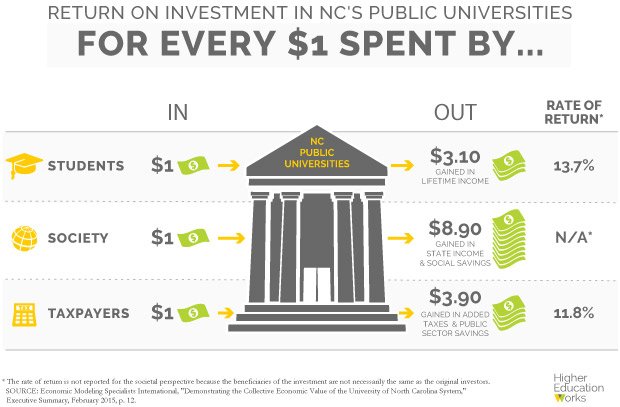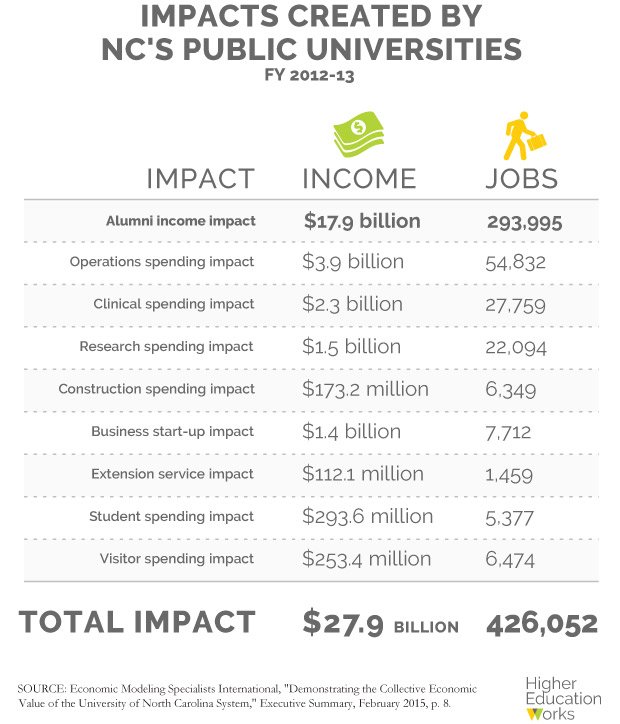
RESEARCH TRIANGLE PARK (Feb. 18, 2015) – Higher education pumps $63.5 billiona year and more than 1 million jobs into North Carolina’s economy, according to an independent economic group’s analysis released today.
The study of the state’s public and private universities and community colleges found that the University of North Carolina system contributes almost $28 billion and more than 425,000 jobs to the state’s economy. [1] (The entire state budget, meanwhile, amounts to $21 billion.) North Carolina’s community colleges contribute an additional $21.5 billion and 375,000 jobs.[2]
“Students, taxpayers and the state of North Carolina are getting a great return year after year on what they invest in their public University,” Tom Ross, president of the University system, said as the results were released. “All of the findings show us why getting more North Carolinians … better-educated is critical.”
The average holder of a bachelor’s degree from a state university will earn $25,700more a year than someone with a high-school degree – a difference of $1.1 million over a career, the the analysts at Economic Modeling Specialists International (EMSI) found.
The study computes that for every dollar a student invests in her education, she will see $3.10 in higher future wages over the course of her career, and taxpayers will see a return of $3.90 on every dollar they invest.
As a financial investment, the study calculates a 13.7% annual return for students and an 11.8% annual return for taxpayers. It compares those returns with a typical return of less than 1% on a savings account.[3]
For students in all categories of higher education, the study found a 12.4% annual return.[4]
“You would be hard-pressed to find any investment for a student that gets you 12.4 percent these days. The stock market gets you 4 or 5 percent,” said Kjell Christophersen, the president of EMSI. “You can conclude that education pays for the individual students.”
Ross and Hope Williams, president of the NC Independent Colleges and Universities, said the results help explain why a high percentage of North Carolinians stay in state for college.
“We do retain a higher portion of our students in our state who stay here to go to college, and we also attract a higher proportion from other states,” said Ross.
The study found that higher education accounts for nearly 15 percent of North Carolina’s gross state product.[5] Christophersen said the 1 million jobs generated by higher education are roughly the equivalent of all manufacturing jobs in the state.
Harvey Schmitt, the president and CEO of the Raleigh Chamber of Commerce, emphasized the importance of workforce preparation given predictions that 65 percent of all jobs will require post-secondary education by 2020.
“It is a differentiator in today’s marketplace,” Schmitt said. “You cannot overestimate the importance of higher education to the vitality of our economy.”
So why cut it? Why stop priming the pump?
Yet over five years – under both Democratic and Republican control – legislators in the North Carolina General Assembly cut state support by $2,516 a student per year. As a result, tuition and fees paid by students increased by $699 per student over the same period.[6]
Societal benefits
The study notes that education correlates with better rates of health, crime and employment. “You are prone to smoke less, to drink less, to be less on welfare,” said Christophersen.
Those individual benefits in turn produce a more vibrant state economy, more income taxes paid to the state, and $18 billion in savings from reduced state spending on social services, law enforcement and unemployment, the study finds.[7]

Conservative methodology
Christophersen and Ross both described the study’s methodology as conservative.
The economists did not count state funds for universities and community colleges, for example, reasoning that the funds would still be spent on something else if they were not spent on higher education.
Similarly, the study counted consumer spending by only out-of-state students, reasoning that in-state students would make purchases in North Carolina whether in college or not.[8]
[1] Economic Modeling Specialists International, “Demonstrating the Collective Economic Value of the University of North Carolina System,” Executive Summary, February 2015, p. 8.
[2]Economic Modeling Specialists International, “Demonstrating the Collective Economic Value of North Carolina Community Colleges,” Executive Summary, February 2015, p. 2.
[4] Economic Modeling Specialists International, “Demonstrating the Collective Economic Value of North Carolina’s Higher Education Institutions,” Executive Summary , p. 9.

Leave a Reply